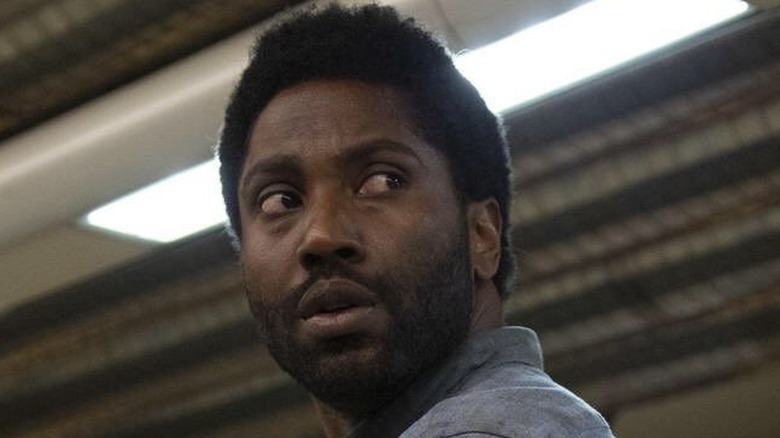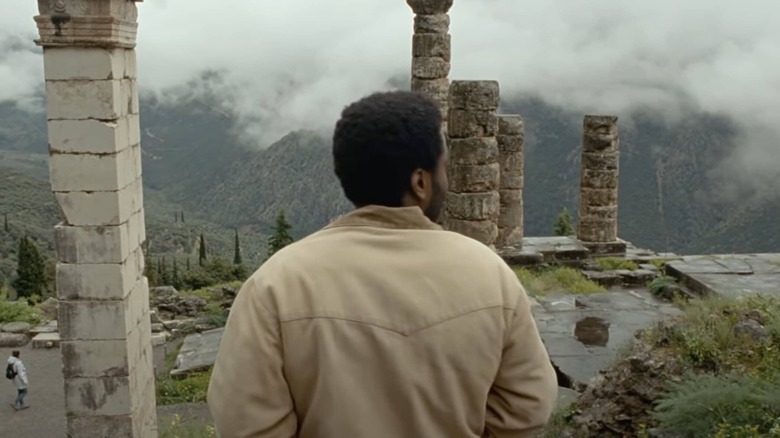Beckett Review: Hitchcock In The Heart Of Greece
It feels like Hollywood is still trying to figure out exactly what kind of screen persona best suits John David Washington. Although he was excellent in Spike Lee's "BlackKKlansman," his ascension to leading even bigger projects has been considerably less assured. It may be inevitable that he's frequently compared to his father Denzel, but the flaws in his performances to date have been a symptom of getting cast in charismatic roles unsuited to his own abilities.
He looks the part of a movie star, but always feels awkward when attempting to live up to the duties that role requires, feeling as out of place delivering punchy one-liners in "Tenet" as he is delivering self-indulgent monologues about Hollywood in "Malcolm and Marie." He's a character actor who seems to be getting wrongly categorized as a leading man who can follow in his father's footsteps, despite the two having very different strengths as performers. This might be why "Beckett," premiering at the Locarno Film Festival before debuting on Netflix on August 13, is the most satisfying star vehicle for the actor to date. Taking inspiration from Alan J. Pakula's paranoid political thrillers and countless Alfred Hitchcock tales of innocent men getting caught up in larger conspiracies, director Ferdinando Cito Filomarino's film expertly casts the actor as an American tourist who unwittingly becomes a target for a shadowy government elite.
It's a classic Hitchcock setup, but Filomarino resists making it into a conventional movie star showcase in the same way, his protagonist always two steps behind the villains tracking him, his desperate need to escape and survive getting in the way of delivering any killer quips. It plays to Washington's strengths as an imposing action star without relying on his awkward imitations of A-lister charisma. "Beckett" should be the blueprint for the ideal John David Washington vehicle going forward.
A doomed getaway
We open days earlier, with Beckett (Washington) and his girlfriend April (a severely under-utilized Alicia Vikander) on holiday in Greece, taking advice to get out of Athens just days before a big political rally and protest. While driving to the Greek countryside, the pair end up in a devastating car accident, crashing into a rural house, with a small boy being the last thing Beckett sees before waking up in hospital the next day. Speaking to the cops about what happened, he is told that nobody has lived in that house for years — but when he's discharged and decides to go back to the scene of the accident, he finds himself targeted by the same authorities, who don't want him digging any deeper into what he unwittingly discovered.
On the run for his life, he urgently hatches a plan to get back to the US embassy in Athens and out of the country, something which proves easier said than done when seemingly every Greek cop is on his tail and ready to take his life. Wounded from the car crash and multiple bullet wounds, he bumps into political activist Lena (Vicky Krieps), who agrees to help take him back to the capital. But as a wanted man on the run, their journey to a supposed safe space is far from the end of his problems.
It takes a short while to settle into the subtle peculiarities of "Beckett," a European production with a mostly Italian creative team behind the camera, which often harks back to the country's genre cinema of the 1960s and 1970s. Back in that heyday, producers would attract the biggest names in world cinema, the majority of whom would perform in their own language regardless of scene partner, before getting dubbed into Italian. That same uncanniness has been updated here; the early stretches of dialogue seem like they've been put through Google Translate and can't help but feel stilted, with added distractions like Vikander using her own accent despite being defined in the screenplay as American (something made even more bizarre when we hear her very American-sounding parents on the phone). It's a star-driven production that feels as close to the Italian cinema of that period as you can get without needing to dub anybody over.
This eventually proves effective at establishing a sense of unease when seen through the eyes of Beckett, with everything feeling ever so slightly off, benefitting from the lack of subtitles when characters speak Greek to keep us in the same confused, paranoid headspace he's in. Even as the wider conspiracy — and which characters shouldn't be deemed trustworthy — becomes more obvious to the viewer, director Ferdinando Cito Filomarino successfully manages to maintain this disquieting tone. This includes the several stretches where the film becomes a simple but effective cat and mouse thriller, Beckett chased everywhere from the countryside to the Athens subway system, the narrative maintaining an intensity precisely because the director wants the audience to figure out the plot mechanics before his protagonist. There is nothing in "Beckett" that hasn't previously been mastered by the greatest thriller directors of all time, but very few Hitchcock homages manage to keep the stakes quite as high and unrelenting throughout.
Wait, this is about Greek politics in the 2010s?
"Beckett" is the director's English language debut, boasting a producing credit from none other than Luca Guadagnino, the filmmaker behind "Call Me by Your Name" and 2018's "Suspiria" remake (the two directors are also former partners). And while it's unwise to compare the two filmmakers based on former collaborations, with Filomarino the second unit director on both those productions, it's clear from "Beckett" that the filmmaker does take inspiration from Guadagnino in one important area — and that's smuggling a distinctly European political commentary into what looks like a straightforward genre homage on the outside.
Think back to Guadagnino's take on "Suspiria," which notably moved the action from Rome to a divided Berlin during the Cold War, or his erotic drama "A Bigger Splash," which contrasted the luxurious lives of its rich protagonists with refugees they spotted arriving elsewhere on their island. "Beckett" is even less subtle in this regard, taking place at some point in the early 2010s (Barack Obama's portrait still hanging on the wall of the US embassy) as Greece was still reeling from a financial crisis a few years earlier. Kevin A. Rice's screenplay takes the facts of that era and heightens them into thriller territory; here, the background story hinges on a leftist politician vowing to end the crisis. He's considered a target by the establishment, who have the backing of a far right party called Sunrise.
In reality, a neo-Nazi political party called Golden Dawn shocked Greece (and much of the world) by gaining seats in the country's 2012 election, with no secret plot by the establishment to get them into office in order to stop their direct opponents. Of course, that wouldn't be as intense a starting point for the deeper conspiracy Beckett finds himself in here. Surprisingly, "Beckett" isn't the first film from outside of Greece to capture how protests rocked the country during this period. 2016's "Jason Bourne," the now widely forgotten finale to the Bourne franchise, sent Matt Damon's action hero to the country at a time of mass uprising, with one shaky-cam-heavy action sequence set at the heart of an Athens protest. Needless to say, "Beckett" is more satisfying as a thriller, its political conspiracy so heightened it can be enjoyed without any knowledge of the real events that inspired it.
"Beckett" is one of the summer's biggest surprises: an exhilarating update of the classic Alfred Hitchcock formula that's well worth seeking out.


